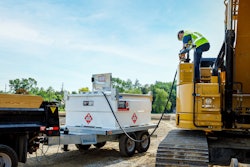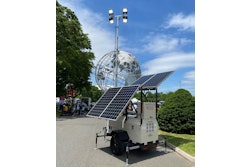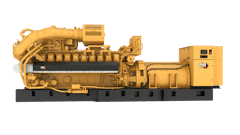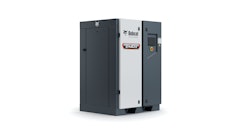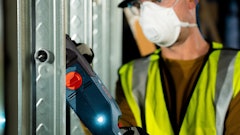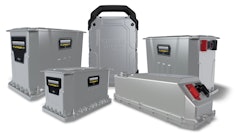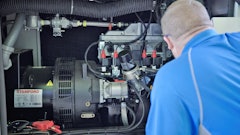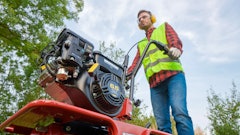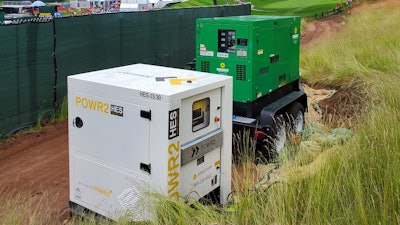
Sustainable power products can be a conundrum for many rental companies. While having obvious environmental and operational benefits, they also create the risk of diluting other revenue streams.
For this article's purposes, we will focus on battery energy storage systems. For those unfamiliar with the product, they are essentially large battery banks that sit between a diesel generator and the load. At times of low load, the battery supports the power requirements from its stored energy. When the battery is depleted or when the load spikes, it automatically turns the generator on.
Manufacturers of these products boldly but accurately claim reductions in fuel and emissions of up to 80 percent. The number of hours on the generator and frequency of service visits in the field are reduced in accordance with the lower run time. On top of these benefits, wet stacking of generators, or having to add parasitic loads to prevent wet stacking, is no longer a worry.
So, with these benefits, why is this a problematic product for rental companies?
With most rentals of a generator, there are three or four revenue streams:
- Basic rental rate
- Additional shift rental for running longer than eight hours
- Additional service charges for maintenance
- Revenue from fuel supply
When adding a hybrid power unit, you almost always reduce or eliminate three of these four revenue streams.
For example: I rent a generator for $1,500 a month. The client wants to run it 24/7, so I double the rental rate to $3,000. As he is running it 24/7, I will need to service it twice a month at a cost of $250 each time. I will also be selling him fuel at $3.50 a gallon at a burn rate of 1 gallon an hour on average. This will allow me to bill $2,352 in fuel. So, my total income will be $5,852.
If I add the hybrid, the generator run time will only be four hours a day instead of 24, so I can only charge single shift. I will now only need to service the generator every two months and the fuel burn will be lower at 2.5 gallons for four hours. So, the new revenue looks like this: $1,500 (rental rate) + $125 (servicing) + $980 (fuel) for a total of $2,605, a reduction of $3,247 in revenue from my previous rental.
How can I justify that reduction in revenue to my shareholders? Can the rental revenue that I get from the hybrid replace what I have lost?
Below, we will address these questions and give you 10 reasons why hybrid power is a successful rental asset and becoming more of a mainstream item.
- Don’t underestimate the climate change movement. Love it or hate it, it's here to stay. The UN Global Climate Compact has 13,760 members and is growing fast. Included in the membership are construction giants Fluor, Skanska and Aecom, among others. These companies have sustainability targets to meet and are looking for ways to reduce carbon on construction sites. The ability to harvest renewable energy has lots of event organizers and large constructors looking for ways to use sources to further reduce their carbon footprint.
- Charging a rental rate for the battery equivalent or greater than what you are losing in other revenue is possible as the client gets the additional environmental benefits.
- Revenue from fuel is typically low margin and can look poor on a rental company’s financials–so much so that some rental companies avoid selling fuel altogether. So, the hybrid can be rented like any other asset.
- The battery has a lower total cost of ownership as it is largely maintenance free. By using battery cells rated for 6,000 discharges, the asset life is well over 10 years.
- Revenue from servicing is not always profitable and can be difficult to maintain the correct service intervals if the generator is in a remote location. Skilled service labor is getting harder to find too, so any reduction in servicing is an operational benefit.
- The resale value and life of your generator increases as it will be running for fewer hours.
- Wet stacking issues and servicing downtime on the site are eliminated.
- The battery supplies uninterrupted power supply for critical applications.
- The power provided is almost silent, which is ideal for certain environments and locations, events, and nighttime work.
- By offering battery energy products, you are showing your clients that you align with their visions for a sustainable planet and that you care.
The battery energy system is becoming the new normal in power rental, and just like the wave of electric cars, buses and trucks, it's the look of the future. Prove this for yourself by:
- Identifying applications where the generator is running for long periods of time and see if hybrid power could reduce that run time.
- Talking to clients about sustainability.
- Adding the hybrid to quotes as standard and start the conversation.
One final note here: beware of greenwashing. As the sustainable/green products gain traction, clients are on the lookout for misinformation or so-called "greenwashing." Ensure any claims you make can be backed by performance data.





